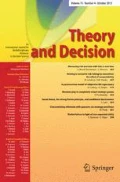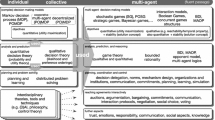Abstract
In economically meaningful interactions negotiations are particularly important because they allow agents to improve their information about the environment and even to change accordingly their own characteristics. In each step of a negotiation an agent has to emit a message. This message conveys information about her preferences and endowments. Given that the information she uses to decide which message to emit comes from beliefs generated in previous stages of the negotiation, she has to cope with the uncertainty associated with them. The assessment of the states of the world also evolves during the negotiation. In this paper we analyze the intertwined dynamics of beliefs and decision, in order to determine conditions on the agents that allow them to reach agreements. The framework for decision making we consider here is based on defeasible evaluation of possibilities: an argument for a choice defeats another one if it is based on a computation that better uses all the available information.
Similar content being viewed by others
REFERENCES
Abreu, D. and H. Matsushima, 1990, Virtual implementation in iteratively undominated strategies, Econometrica 60, 993–1008.
Aumann, R. and A. Brandenburger, 1995, Epistemic foundations of Nash equilibrium, Econometrica 63, 1161–1180.
Doyle, J., 1990, Rationality and its role in reasoning, Proceedings AAAI-90.
Dung, P., 1995, On the acceptability of arguments and its fundamental role in non-monotonic reasoning, logic programming, and n-person games, Artificial Intelligence 77, 321–357.
Fudenberg, D. and J. Tirole, 1991, Game Theory, Cambridge, MA: MIT Press.
Halmos, P., 1960, Naive Set Theory, New York: Van Nostrand.
Kraus, S., J. Wilkenfeld and G. Zlotkin, 1995, Multiagent negotiation under time constraints, Artificial Intelligence 75, 297–345.
Loui, R., 1987, Defeat among arguments: a System of Defeasible Inference, Computational Intelligence 3, 100–106.
Loui, R., 1990, Defeasible specification of utilities, in Knowledge Representation and Defeasible Reasoning, H. Kyburg et al., (eds.) Dordrecht: Kluwer.
Loui, R., 1998, Process and policy: resource-bounded non-demonstrative reasoning, Computational Intelligence 14, 1–38.
Moore, J., 1992, Implementation in economic environments with complete information, in Advances in Economic Theory, Laffont, J. (ed.), Cambridge, MA: Cambridge University Press.
Myerson, R., 1991, Game Theory: Analysis of Conflict, Cambridge, MA: Harvard University Press.
Sen, A., 1986, Social choice theory, in K. Arrow and M. Intriligator (eds.) Handbook of Mathematical Economics III, Amsterdam: Elsevier.
Simari, G. and R. Loui, 1992 A mathematical treatment of defeasible reasoning and its implementation, Artificial Intelligence 53, 125–157.
Simon, H., 1982, Models of Bounded Rationality, Cambridge MA: MIT Press.
Sandholm, T. and V. Lesser, 1997, Coalitions among computationally bounded agents, Artificial Intelligence 94, 99–137.
Stokey, N., R. Lucas, and E. Prescott, 1989, Recursive Methods in Economic Dynamics, Cambridge, MA: Harvard University Press.
Tarski, A., 1955, A lattice-theoretical fixpoint theorem and its applications, Pacific Journal of Mathematics 5, 285–309.
Tohmé, F., 1996, Negotiation as a Resource Allocation Process, Washington University in Saint Louis Computer Science Technical Report WUCS-96-22.
Verheij, B., 1996, Rules, Reasons and Arguments: Formal Studies of Argumentation and Defeat, Ph.D. Thesis, Maastricht (The Netherlands): Maastricht University.
von Neumann, J. and O. Morgenstern, 1944, Theory of Games and Economic Behavior, New York: Wiley.
Vreeswijk, G., 1991, The Feasibility of Defeat in Defeasible Reasoning, Proceedings Second International Conference on Principles of Knowledge Representation and Reasoning.
Vreeswijk, G., 1993, Studies in Defeasible Argumentation, Ph.D. thesis, Amsterdam: Free University.
Author information
Authors and Affiliations
Rights and permissions
About this article
Cite this article
Tohmé, F. Negotiation and Defeasible Decision Making. Theory and Decision 53, 289–311 (2002). https://doi.org/10.1023/A:1024189714814
Issue Date:
DOI: https://doi.org/10.1023/A:1024189714814




